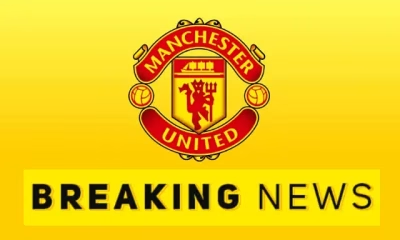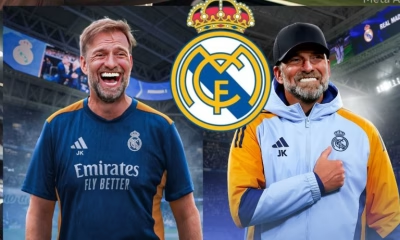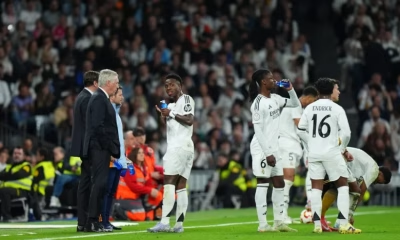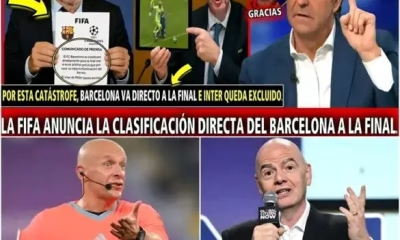Arsenal
New angle of William Saliba penalty incident during Brighton vs Arsenal emerges and it changes everything

**New Angle of William Saliba Penalty Incident During Brighton vs Arsenal Emerges, and It Changes Everything**
In what seemed like a routine match between Arsenal and Brighton at the Amex Stadium, the atmosphere shifted when a controversial penalty was awarded to the Seagulls in the second half. William Saliba, one of Arsenal’s standout defenders, was adjudged to have fouled Brighton’s attacker in the box—a decision that sent shockwaves through the Arsenal fanbase and sparked heated debates across social media and punditry.
At the time, the penalty appeared clear-cut: Saliba’s outstretched leg had made contact with the attacking player, who went down easily. The referee didn’t hesitate, pointing to the spot, and fans at home and in the stadium braced themselves for a crucial moment in the game.
But just when it seemed like the narrative was set—Arsenal would have to overcome yet another contentious decision—an astonishing new angle of the incident emerged. The footage, captured by a fan from a lower-tier stand behind the goal, painted an entirely different picture.
From this angle, it became clear that Saliba’s challenge was not as reckless or careless as originally thought. In fact, the video revealed something many had missed: the Brighton player had initiated the contact by stepping on Saliba’s foot, which caused the defender to shift his position awkwardly. The video showed Saliba trying to retract his leg, and in doing so, his knee inadvertently brushed the Brighton player’s back, but only in a very minimal way. There was no clear, forceful tackle that would justify a penalty.
Upon reviewing the new footage, many pundits, including those who had initially supported the penalty, began to question the referee’s decision. The previously clear-cut foul was now in doubt, with some calling for a closer examination of VAR protocol. Arsenal fans, who had been vocal in their criticism of the original call, now felt vindicated. The new footage had cast doubt on the fairness of the decision.
As the media reacted to the revelation, some began to draw comparisons to other high-profile penalty incidents from the season, debating whether the inconsistency in refereeing was becoming a growing concern in English football. Some argued that VAR, which was supposed to bring clarity to such decisions, had failed to intervene when it should have, leaving the referee to make a subjective call based on incomplete information.
Arsenal’s manager, Mikel Arteta, was quick to respond in his post-match interview. “Football should be about fairness and clarity,” he said. “We’ve all seen the footage. It changes everything. We need to ensure that such decisions are being made with the right tools and the right understanding. If it’s a mistake, it’s a mistake—but it’s one that we need to address for the sake of the game.”
For Brighton, who ultimately scored from the penalty and went on to win 2-1, the situation was bittersweet. While they had capitalized on the controversial call, manager Roberto De Zerbi expressed understanding of Arsenal’s frustrations, though he refrained from commenting too heavily on the decision itself.
As the dust settled, the wider discussion turned to how technology could be better utilized to prevent similar mistakes in the future. Whether or not the result of the match would be reviewed remained to be seen, but one thing was clear: the new angle had changed everything.
The Saliba penalty incident, once viewed as a settled controversy, had now become a flashpoint for a broader conversation about the role of referees and VAR in shaping the modern game. The question lingered: how many more crucial decisions were potentially being made without all the facts?
-

 Manchester United7 months ago
Manchester United7 months agoManchester United fired off more than 22 attempts trying to find the net against Nottingham Forest, with one player squandering around six clear opportunities without scoring. Ruben Amorim was visibly frustrated, publicly calling out a Manchester United star for failing to convert even once, despite facing an unguarded goal on multiple occasions.
-

 Manchester United7 months ago
Manchester United7 months agoBREAKING NEWS: “Isak Has Agreed to Join Man United… BUT Only If They Allow That Guy to Join Us!” – Eddie Howe’s Shocking Transfer Demand Stuns Fans.
-

 Liverpool7 months ago
Liverpool7 months agoLFC TRANSFER UPDATES LIVE Liverpool open to selling ( 7) players this summer, including £50 million star who Arne Slot claimed is ‘important’
-

 Liverpool7 months ago
Liverpool7 months agoReal Madrid are discussing a move to appoint former Liverpool boss Jürgen Klopp as their new manager if Carlo Ancelotti steps away and takes over Brazil.
-

 Real Madrid7 months ago
Real Madrid7 months agoI have warned Carlo Ancelotti about that particular player, he refused to bench him, He keeps causing problems to the teams, He Almost Denied Real Madrid three points against Real Sociedad after taking the lead in the Copa del Rey Semi Finals “: Former Real Madrid Legend Cristiano Ronaldo names ONE player who doesn’t deserve to start for Real Madrid, warned Ancelotti about the unforgivable mistake
-

 Premier League7 months ago
Premier League7 months agoPremier League Shock: Manager Sacked Amid Season Struggles”
-

 Liverpool7 months ago
Liverpool7 months agoAlexander Isak to Liverpool swap deal option emerges as transfer pathway clears
-

 Barcelona6 months ago
Barcelona6 months agoFIFA officially announces Barcelona will play in the FINAL—and Inter Milan have been KICKED OUT… after referee Szymon Marciniak was ARRESTED in a stunning late-night operation!…
